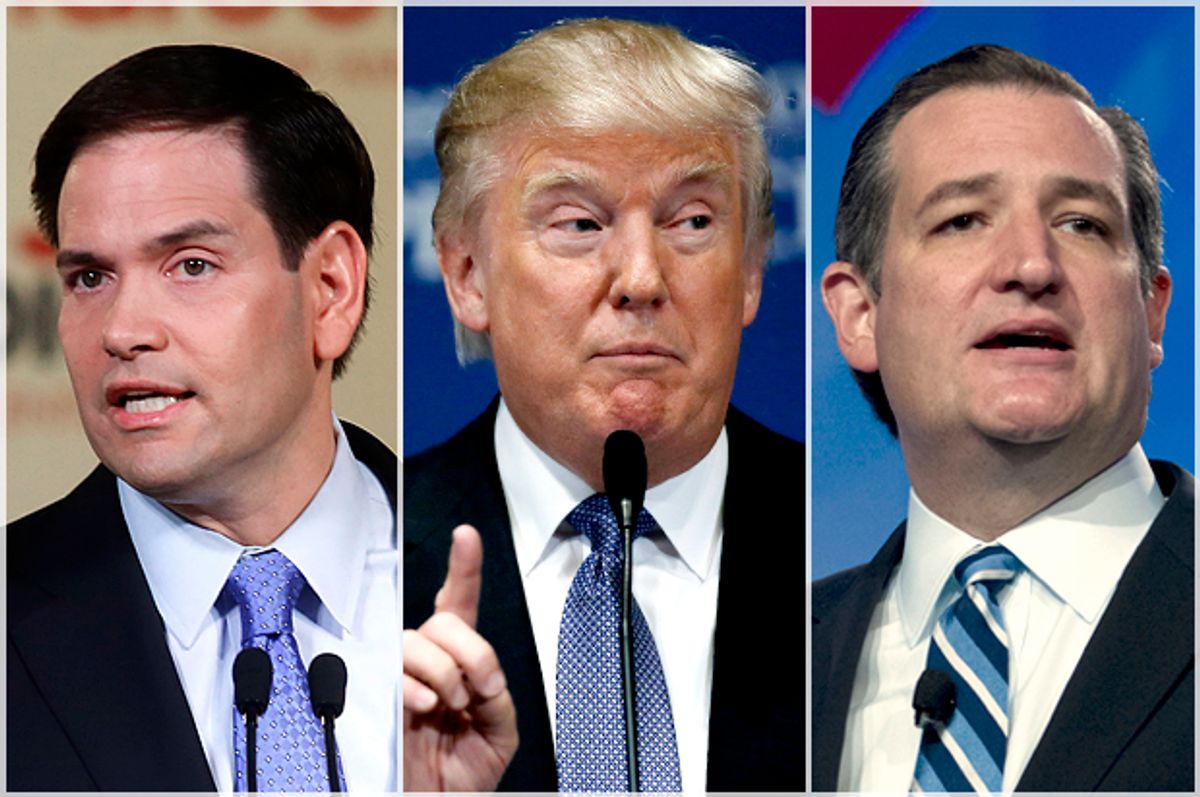The detritus of the 2016 Republican presidential race is composed of candidates who bet everything on winning the Iowa caucus. Scott Walker, Rick Perry and Bobby Jindal were all, at one point or another, singularly focused on Iowa – not because that’s a particularly good strategy, but because they had no other choice. Iowa is the first state to hold a nominating contest, and it’s jam-packed with white evangelical voters who just love to caucus. If you’re a hard-right outsider candidate with an unkillable desire to be president, Iowa is your best opportunity to assert yourself and make an impact on the race.
The problem with the all-out Iowa-centric strategy is that there are other elections and caucuses after Iowa, and they’re not all so uniquely white, Christian, conservative and corn-loving as the Hawkeye State.
That brings us to Ted Cruz. The Texas senator, I should hasten to point out, is a very different candidate from Walker, Perry and Jindal; he’s capable of raising money and his poll numbers are on an upward trajectory. Nowhere is this more evident than in Iowa, where the last two polls have put him in second place, only narrowly trailing Donald Trump. Cruz’s surge in Iowa makes sense given that the Cruz game plan is essentially to embrace the Iowa-is-everything strategy, but apply it nationally. Cruz’s path to the White House, as he sees it, is to drive up turnout among white voters and conservative Christians. “Today, roughly half of born again Christians aren’t voting,” he said at his announcement speech back in March. “They’re staying home. Imagine instead millions of people of faith all across America coming out to the polls and voting our values.”
For the moment, this strategy is reaping dividends in one place where it was likely to, and people are starting to talk about Cruz as a sleeper threat for the nomination. But let’s be clear: Cruz still faces a mountain of troubles, both inside Iowa and beyond.
His most immediate problem in Iowa is Donald Trump, who has been dominating the polls there and appears to have successfully beaten off a challenge from Ben Carson. Cruz’s rise seems to be coming at Carson’s expense, but the question is whether he’ll have more success in knocking Trump out of the top spot. The Cruz strategy relies to a large degree on a Trump collapse – the candidate and his campaign are upfront about this and are confident that Cruz will catch the majority of Trump’s supporters if and when they bolt. But that collapse still hasn’t happened, and if Trump proves to be more durable than previously assumed, that puts Cruz in the awkward position of needing to hasten Trump’s demise while not alienating his voters.
But let’s say Cruz does beat out Trump and wins the Iowa caucus. Then he runs into the post-Iowa problem of having to win over electorates that aren’t so overwhelmingly conservative – a problem that is especially pronounced in non-caucus states. “There is not a single primary state where ‘very conservative’ voters represent as large a share of the electorate as they do in Iowa,” the New York Times notes. His best hope would seem to be that the hard-right segment of the GOP base coalesces around him while the more moderate, establishment-friendly segments remain divided between several candidates. That may be possible, but one shouldn’t underestimate how much the Republican establishment loathes Ted Cruz. They’re already starting to line up behind Marco Rubio because they want to make clear to Cruz just how much they hate him and don’t trust him.
But even if those stars do align for Cruz, his own campaign still sees a long, brutal slog for the nomination that goes all the way to the convention. Their strategy assumes that he can endure a series of early losses and make it through to the later contests, in Western and Southern states, where it’s assumed he’ll be on firmer ground to pick up delegates. It’s no small task keeping a presidential campaign funded when a) you’re not winning, and b) donors and voters want to get behind the people who are winning. And, again, one can assume the party establishment will do everything it can to avoid precisely this sort of messy delegate fight.
That’s not to say Cruz is utterly without hope. The fractious nature of the Republican field and the unnatural political gravity exerted by Donald Trump have thrown the race into disarray and left open avenues for candidates with narrower appeal, like Cruz, to exploit. But much of what he can accomplish depends on the failures of others. If Trump implodes and his supporters defect to Cruz, and if the rest of the field remains a jumbled mess of uncertain loyalties, then Cruz could capitalize on the chaos. Otherwise, he’ll be the latest Republican presidential hopeful to have a strong showing in Iowa, and then slowly fade.


Shares